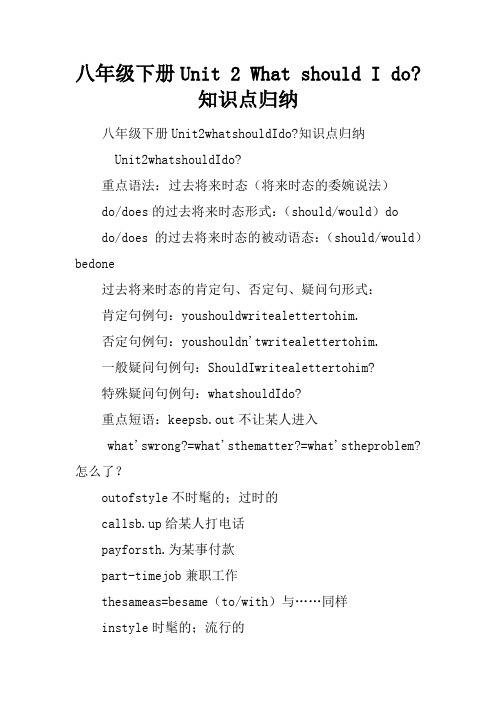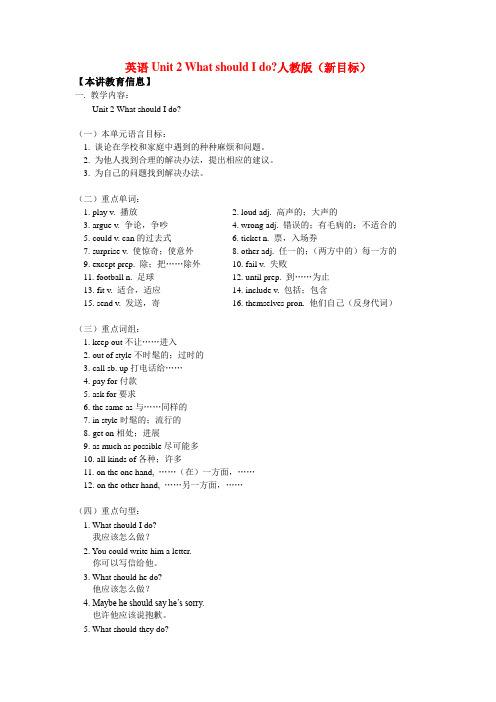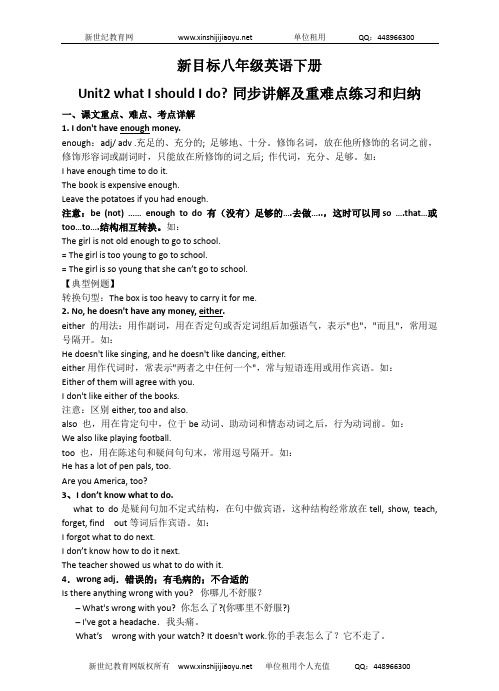江西省金溪县第二中学八年级英语下册 Unit 2 What should I do Section A(1a-2c)导学案 人教新目标版
- 格式:doc
- 大小:91.00 KB
- 文档页数:3

八年级下册Unit 2 What should I do?知识点归纳八年级下册Unit2whatshouldIdo?知识点归纳Unit2whatshouldIdo?重点语法:过去将来时态(将来时态的委婉说法)do/does的过去将来时态形式:(should/would)dodo/does的过去将来时态的被动语态:(should/would)bedone过去将来时态的肯定句、否定句、疑问句形式:肯定句例句:youshouldwritealettertohim.否定句例句:youshouldn'twritealettertohim.一般疑问句例句:ShouldIwritealettertohim?特殊疑问句例句:whatshouldIdo?重点短语:keepsb.out不让某人进入what'swrong?=what'sthematter?=what'stheproblem?怎么了?outofstyle不时髦的;过时的callsb.up给某人打电话payforsth.为某事付款part-timejob兼职工作thesameas=besame(to/with)与……同样instyle时髦的;流行的geton[well]withsb.=getalong[well]withsb.与某人相处(好)didn't=didnotcouldn't=couldnotas…aspossible尽可能……(eg/assoonaspossible尽快)allkindsof各种;许多ontheonehand一方面ontheotherhand另一方面asksb.forsth.=asksb.todosth.请求某人做某事asksb.nottodosth.请求某人不要做某事spend(money)onsth.=spend(money)[in]doingsth.花钱做某事sth.costsb.(money)某人花钱为了某事takesb.sometimetodosth.花某人时间做某事findout查明findsb.doingsth.发现某人做某事beangrywithsb.生某人的气beangryatsth.生某事的气thesameageas=asoldas与某人年龄一样havefightwithsb.与某人打架learntodosth.学会做某事not…until…直到……才……comparesth.(A)withsth.(B)把某事(A)与某事(B)作比较it'stimeforsth.=it'stimetodosth.到该做某事的时间了maybeadv.或许maybe(情态动词+动词原形)可能是shall→should情态动词shall的原形和过去式pay→paid→paid动词pay的原形、过去式和过去分词ReadingStrategy(阅读方法)youwilllearntousenewwordsbetterifyouusealearner'sdi ctionary.(时刻学着应用新单词来学习比时刻使用字典这种途径方法更好。

八下Unit 2 What should I do? 说课稿各位评委:上午好!今天我说课的内容是《新目标英语》八年级下册Unit 2的SectionA the first period. 课题是What should I do?一.教材分析本单元的中心话题是:Talk about problems people have and learn how to give people advice. 通过学生熟悉的话题来激发学生的学习兴趣,从而提高学生运用英语的综合语言能力。
本单元的教学内容,从教材的整合来说,是八年级上册Unit 2 What’s the matter?的延续,也是对情态动词should,could的用法做进一步的拓展和综合运用。
通过本单元的教学使学生学会情态动词should,could的用法,并就自己生活和学习中存在的某些问题与他人讨论,并征求别人的建议,从而找到合理的解决办法。
从本单元来说,本节课集中呈现了本单元的基本词汇和语言结构,是本单元的基本语言内容,同时又为本单元的知识拓展和综合语言运用奠定了坚实的基础。
因此。
上好SectionA 的前部分既可以让知识学习具有一定的延续性,又可以为下面的教学做好铺垫,对完成本单元的教学内容具有重要的意义。
基于以上分析,本节要达到以下目标。
二、教学目标1、知识技能目标:能听、说、读、写、单词: argue,style,ticket, Surprise,either,should,could,original,haircut,except等并了解其含义。
短语:keep out,out of style,on the phone,pay for,part-time job,The same as,in style,get on及句型:What’s wrong? What’s the matter? What should I do?2、过程方法:通过就自己的麻烦和问题,向他人征求建议,并能够为他人的问题找到合理的解决办法,提出相应的建议。

人教版八年级英语下册unit2 “ What should I do?”这个单元跟我们在八年级上册学习的关于对别人身体健康状况所提建议的句子是一样的,只不过在这个单元里,我们的学习范围扩大了,不仅仅是关于疾病的建议了,更多的是关于学习,生活和工作上所遇到的各种各样的困惑和麻烦,针对这些问题,给出合理的建议和使用什么样的句型比较好,这就是我们这节课所要学习的主要内容了。
在英语学习中,关于提建议的句型有很多,但在这个单元,我们主要是要掌握两个句型:“You should\shouldn’t …..”和“youcould\couldn’t….”主要是让学生用英语谈论自己的难题和向别人提建议,在引入方面我用猜测游戏的形式复习上册的关于疾病的问答,让几个学生轮流用表情表示不舒服,一个学生提问:What’s the matter? 各组学生竞猜,猜对后表演的学生问 What should I do?各组又举手抢答,表达正确加分在小组上。
接着先让学生结合自己的实际情况谈论学校和家庭中的种种麻烦和问题,例如: I argued with my best friend. I don’t have enough money .My math is poor 。
My clothes are out of style 等等.然后,我接着示范用should和could 来提建议,让学生去体会两种说法的区别,再让学生自己给有难题的同学提建议,为他人找到合理的解决办法,提出相应的建议及为自己的问题找到解决办法。
让学生使用“good idea”“okay idea”或“bad idea”表达对建议的看法。
接着,让学生练习情景对话,两人一组编对话,围绕问题,让学生给出Advice----具体用主题句:What should I do? / You could/ should/ shouldn’t….进行口语操练.然后再利用小组竞赛的方式让学生针对之前提出的难题提建议,比比谁提的建议最多,最好。

八年级下册Unit 2 hat shuld I d?知识点归纳八年级下册Unit2hatshuldId?知识点归纳Unit2hatshuldId?重点语法:过去以后时态(以后时态的委婉说法)d/des的过去以后时态形式:(shuld/uld)dd/des的过去以后时态的被动语态:(shuld/uld)bedne 过去以后时态的确信句、否定句、疑问句形式:确信句例句:ushuldritealetterthi否定句例句:ushuldn'tritealetterthi一样疑问句例句:ShuldIritealetterthi?特殊疑问句例句:hatshuldId?重点短语:eepsbut不让某人进入hat'srng?=hat'stheatter?=hat'stheprble?怎么了?utfstle不时兴的;过时的allsbup给某人打pafrsth为某事付款part-tieb兼职工作thesaeas=besae(t/ith)与……一样instle时兴的;流行的getn[ell]ithsb=getalng[ell]ithsb与某人相处(好)didn't=didntuldn't=uldntas…aspssible尽可能……(eg/assnaspssible尽快)allindsf各类;许多nthenehand一方面nthetherhand另一方面assbfrsth=assbtdsth请求某人做某事assbnttdsth请求某人不要做某事spend(ne)nsth=spend(ne)[in]dingsth花钱做某事sthstsb(ne)某人花钱为了某事taesbsetietdsth花某人时刻做某事findut查明findsbdingsth发觉某人做某事beangrithsb生某人的气beangratsth生某事的气thesaeageas=asldas与某人年龄一样havefightithsb与某人打架learntdsth学会做某事nt…until…直到……才……paresth(A)ithsth(B)把某事(A)与某事(B)作比较it'stiefrsth=it'stietdsth到该做某事的时刻了abeadv或许abe(情态动词+动词原形)可能是shall→shuld情态动词shall的原形和过去式pa→paid→paid动词pa的原形、过去式和过去分词ReadingStrateg(阅读方式)uilllearntusenerdsbetterifuusealearner'sditinar(时刻学着应用新单词来学习比时刻利用字典这种途径方式更好。

英语Unit 2 What should I do?人教版(新目标)【本讲教育信息】一. 教学内容:Unit 2 What should I do?(一)本单元语言目标:1. 谈论在学校和家庭中遇到的种种麻烦和问题。
2. 为他人找到合理的解决办法,提出相应的建议。
3. 为自己的问题找到解决办法。
(二)重点单词:1. play v. 播放2. loud adj. 高声的;大声的3. argue v. 争论,争吵4. wrong adj. 错误的;有毛病的;不适合的5. could v. can的过去式6. ticket n. 票,入场券7. surprise v. 使惊奇;使意外8. other adj. 任一的;(两方中的)每一方的9. except prep. 除;把……除外10. fail v. 失败11. football n. 足球12. until prep. 到……为止13. fit v. 适合,适应14. include v. 包括;包含15. send v. 发送,寄16. themselves pron. 他们自己(反身代词)(三)重点词组:1. keep out不让……进入2. out of style不时髦的;过时的3. call sb. up打电话给……4. pay for付款5. ask for要求6. the same as与……同样的7. in style时髦的;流行的8. get on相处;进展9. as much as possible尽可能多10. all kinds of各种;许多11. on the one hand, ……(在)一方面,……12. on the other hand, ……另一方面,……(四)重点句型:1. What should I do?我应该怎么做?2. You could write him a letter.你可以写信给他。
3. What should he do?他应该怎么做?4. Maybe he should say he’s sorry.也许他应该说抱歉。

新目标八年级英语下册Unit2 what I should I do?同步讲解及重难点练习和归纳一、课文重点、难点、考点详解1. I don't have enough money.enough:adj/ adv .充足的、充分的; 足够地、十分。
修饰名词,放在他所修饰的名词之前,修饰形容词或副词时,只能放在所修饰的词之后; 作代词,充分、足够。
如:I have enough time to do it.The book is expensive enough.Leave the potatoes if you had enough.注意:be (not) ……enough to do 有(没有)足够的….去做…..,这时可以同so ….that…或too…to….结构相互转换。
如:The girl is not old enough to go to school.= The girl is too young to go to school.= The girl is so young that she can’t go to school.【典型例题】转换句型:The box is too heavy to carry it for me.2. No, he doesn't have any money, either.either的用法:用作副词,用在否定句或否定词组后加强语气,表示"也","而且",常用逗号隔开。
如:He doesn't like singing, and he doesn't like dancing, either.either用作代词时,常表示"两者之中任何一个",常与短语连用或用作宾语。
如:Either of them will agree with you.I don't like either of the books.注意:区别either, too and also.also 也,用在肯定句中,位于be动词、助动词和情态动词之后,行为动词前。
八年级下册新目标英语Unit2《What should I do》教学设计课程名称《Section A 1a-2b 》授课人李妍学校名称陆川县米场镇福达中学教学对象八年级科目英语课时安排1课时一、教材分析本课是unit2的第一课,以“what should I do?”为中心话题。
学会向别人寻求意见及为别人提出意见并以此开展一系列的听、说、读、写等教学活动,进一步提高学生综合运用语言的能力。
本课以素质教育为目的,结合教材重点、难点及英语学科特点,利用多媒体辅助教学。
从听、说、读、写等方面使学生得到训练,在愉快、轻松的氛围中温故而知新,达到初步运用英语交际的能力。
教学中我运用了多媒体课件,来帮助学生创设英语的语言环境,使学生能够置身于真实的语言环境中去学习语言。
首先,我利用跟读单词来让学生熟悉本节课所需要用到及掌握的单词。
然后通过复习前面几个单元所学的知识导入新课,引起有意注意,同时引出本课的重点“you should …”。
在看、听、说、练的过程中掌握此句型。
本课采用实践性强、任务明确的“任务型”语言教学( task—based language teaching and learning ) , 即在教师指导下, 让学生带着明确的任务目标,在感知、体验、实践、参与、合作的活动中, 积极主动地进行学习。
利用多媒体课件中的图片展示,让学生学会看图描述正在发生的动作。
让学生将所学的知识运用到实际生活中。
多媒体课件的使用超越了时间和空间的限制,将书本知识还原为实际生活经验,将抽象的知识具化为与学生生活实际相关、学生感兴趣的话题,使学生通过思考、调查、讨论、交流和合作等方式学习和使用英语, 完成学习任务。
二、教学目标及难重点(知识与技能,方法和过程,情感态度与价值观)教学目标:根据新课程标准的理念,学生的学习目标应将知识与能力、过程与方法、情感态度与价值观这三方面融为一体。
因此,我将本节课的教学目标制定如下:1.语言目标:词汇:play, argue, wrong, style, out of style, could, call sb.up, ticket, surprise, keep out, on the phone. What’s wrong? What’s the matter?。
Unit 2 What should I do Self check&Reading3.熟悉一些固定词组的使用环境。
【重难点预测】1.文章中长难句比较多,理解起来比较困难。
2.精读的技巧【新知导学】1.-What do you usually do after school?-I usually play soccer.2.-What don’t you do after school?-I don’t play ping-pong.【自主预习】1.请同学们先认真阅读学习目标,然后仔细研读短文,做好读前工作和读后工作,看完后将自己认为重要的和困难的内容进行归纳,画出并用红笔做好疑难标记。
2.试着读一读单词表中本课时的新单词(或词组),将不会的单词圈出来,然后通过听磁带或求助于其他等方式将单词读准、读熟。
3.你能说出这些词组的英文吗?一方面……另一方面_________________ 各种各样的_______________________尽可能…… ________________________ 直到……才_______________________找到时间(做某事)_________________ 太大的压力_______________________足够忙_____________________________ 抱怨……_________________________ 把……和……比较___________________ 派人去请,派人去叫________________ 【合作探究】任务1:阅读课本上第15页的课文,然后根据课文的内容判断正(T)误(F):1. The writer’s cousin is older than the writer .( )2. How do they get on with each other ? ( )3. The writer was very angry because his cousin didn’t return his math book last week . ( )4. His cousin is his classmate . ( )任务2:七嘴八舌说一说你的课后生活丰富多彩吗?每天放学后,你们都会做些什么呢?每个周末,你们又会做些什么呢?哪些是你经常做的,哪些又是你有时做的?你的父母对你的课后活动有什么态度?把你的这些跟小组同学说一说吧,看看谁的课余生活有滋有味。
Unit 2 What should I do(1)单元教材分析学会should ,Why don’t you和could在英语中的习惯用法。
使用这些习惯用法,就自己生活、学习中存在的某些实际问题提出建议;拒绝、接受别人的建议。
在学习贴近学生生活实际的语言知识的同时,特别关注学生生活和学习中的真实困难和烦恼。
进一步引导学生对自我和周围世界进行比较客观的认识、评价,发展学生主动解决问题的自我意识和行为能力。
发展学生与人和谐交往的能力;培养在学生交流中寻求帮助。
既坚持自己观点、又听取别人建议。
单元总体目标1. The students will learn to talk about problems.2. The students can help people in trouble and how to give advice.3. Practice the sentences with “could, couldn’t, shouldn’t”.4. To learn the words and expressions about reading passage.单元重难点一览单元学情分析In this unit students learn to talk about problems and give advice. First make up a problem you might be having and write you could do about it. Secondly read the problem to the class again and help the class give advice using the words could, should, shouldn’t. In the end, make sentences with the words and write some letters or make conversations.单元教学建议Ask the students to read papers or magazines to find some problems the people have, then ask the students to make a chart with each problem. Ask some students to write a paragraph about the worst advice they ever got, and guess what the problem is. Maybe ask three or five students to work in group for a radio talk show where people call in for advice.单元课时分配Five periods第一课时教学内容1. To learn the words and expressions about this period.2.To talk about the problems serious or not for them in daily life.3.To learn how to describe the problems you have or how to help others to give him orher some advice.教学目标知识与能力1. Knowledge aims: Words and expressions; How to use should, could, shouldn’t;2. Ability aims: Express the good ideas to solve the problems;Help others when they are in trouble.过程与方法首先谈论生活中严肃或不严肃的事情;通过听力训练和口语表达学会如何表达自己的困难,如何给别人提建议等;通过谈论表达自己对有些困难的理解,提出个人不同的建议。
Unit 2 What should I do Section A1. I don’t want that coat , It’s out of s________ .2. There is something w_______ with my bike .3. Do you have another t_______ to the football match ?4. She is ve ry kind, she is never wants to a_______ with others.5. It’s impolite to p_______your MP4 in c lass.能力题二、翻译下列各句,每空一词1.你能告诉我那件事吗?_______ you _______ me about it ?2.下一步我们该做什么?_______ _______ we do ______ ?3.你应该遵守校规。
You ________ _______ the _______ _______ .4.北京冬季可能很冷。
The _______ _______ Beijing _______ _______ very cold in w inter . 5.孩子应该对老人有礼貌。
Children _______ _______ _______ _______ the old.拓展题三、找出句中的错误1. You should found a new friend. ( )____ __A B C D2. Why not to come to my house? ( )______A B C D3. If you want to pass the exam, you shoul dn’t study harder. ( )______A B C D4. Y ou can call up me when you need help. ( )______A B C D5. My father got three tickets of the football game. ( )______A B C DSection A ( 1a – 2c)【达标测评】一、1.style 2.wrong 3.ticket 4.argue 5.play二、1.Can, tell 2.What should, then 3.should follow, school ruler4.weather in, may be5.should be polite t o三、1. C found -f ind 2.B to come-come 3.C shouldn’t-should4.B call up me-call me up5.C of-to( )1.-Could I borrow your ruler ?-Of course , you ____ .A. canB. couldC. willD. need( ) 2.What ____ I do if I argue with my best friend ? You should go to his house .A. canB. mustC. shouldD. could( ) 3.He doesn’t feel well . He should ____ in bed and have a rest .A. stayB. staysC. stayingD. to stay( ) 4.That dress looks really _____, I must buy a cooler one.A. in styleB. much biggerC. a litter smallerD. out of style( ) 5.She is worried, because she has no enough money to _____ workers’ salary.A. spendB. pay forC. costD. take能力题二、句型转换(改同义句)1. Her clothes are all out of style.All _____ her clothes aren’t _____ style.2. What’s the problem with you?What’s _____ _____ you?3. Gina bought a bike with 80 dollars last month.Gin a _____ 80 dollars _____ a bike last month.4. The desk is too heavy for me to move.The desk isn’t _____ _____ for me to move.5. Why don’t you buy your mother some flowers?Why _____ buy some flower _____ your mother.拓展题三、从方框内选出适当的句子完成对话A: Hi, Dave. Wha t’s the matter?B: __1___A: __2___B: Yes.A: But why?B: My parents want me to go to music and art cl asses after school. You know I am not interested in them at all. I like playing ball games very much. I want to be a famous football player.A: You should tell them about it.B: __3___A: __4___B: It’s unlucky to have such kind of parents.A: I’m sorry to hear that.B: What should I do?A: __5___B: I hope so. I’ll have a try. Thank you very much.A: You’re welcome.A. Really?B. What a pity! But you shouldn’t argue with them.C. I told them again and again, but the y wouldn’tlisten to me.D. I argued with my parents.E. You should talk to them again or write to them.Maybe they will understand you.F. You shouldn’t talk to them.G. You are right to do so.Section A ( 3a – 4)【达标测评】一、ACADB二、1.of, in 2.wrong with 3.paid, for 4.light enough 5.not, for三、DACBE。
Unit 2 What should I do Section A(1a-2c)
【重难点预测】
1.could 和should的合理使用。
2.用英文正确表达自己的困境。
【新知导学】
1.回顾八年级上册Unit 2的知识点。
-What’s the matter?
-I have a headache.
2. -What’s wrong with you?
-My clothes are out of style.
-Maybe you should buy some new clothes.
【自主预习】
1.请同学们先认真阅读学习目标,然后仔细研读课本,看完后将所学到的东西进行归纳,画出重要知识点,并用红笔标出疑难部分,以便在小组内解决。
2.试着读一读单词表中本课时的新单词(或词组),将不会的单词圈出来,然后通过听磁带或求助于其他等方式将单词读准、读熟。
3.正确朗读下列单词,要借助音标哦:
style__________________________ argue __________________________
wrong ________________________ ticket___________________________
surprise_______________________ loud____________________________
4.你能写出下列词语的意思吗?如有困难,可借阅资料。
过时了______________________________ 拨电话给某人__________________________ 和某人吵架__________________________ 写信给某人____________________________ 让某人感到惊讶______________________ 通过电话交流__________________________ 给某人一场球赛的票__________________ 不让……进入__________________________ 【合作探究】
任务1:说出你的烦恼
My parents want to me stay at home every night.
My brother plays his CDs loud.
I don’t have enough money.
I argue with my best friend.
My clothes are out of style.
______________________________________________________________________________
______________________________________________________________________________ ______________________________________________________________________________ 任务2:练练你的耳朵
认真倾听1b,2a和2b,掌握用could和should帮人解决烦恼。
相信你会是个好的listener.
任务3:模仿下面的对话,说说自己的烦恼,听听大家的意见。
A: What’s wrong ?
B: My clo thes are out of style .
A: Maybe you should buy some new clothes.
A:_____________________________________________________________________
B:_____________________________________________________________________
A:_____________________________________________________________________
考点聚焦
◆could和should
两者都是情态动词,后跟动词原形。
c ould是can的过去形式,1)可以表示许可,委婉地提出请求或给出建议。
2)表示过去的能力。
3)表示推测,用于否定和疑问句中。
should 表示建议或给予劝告,还可以表示推测。
should和could用来表示建议时,表示轻微地批评或遗憾,但could语气更委婉客气。
should 意为“应该,应当”,could意为“可以,不妨”。
练一练:判断选择could 或should
1. You _______ write him a letter.
2. Maybe you _______ call him up.
3. You _______ say you’re sorry.
4. You _______ go to his house.
◆argue
一般作不及物动词,意为“争吵”。
名词形式为argument。
常用的词组有:
argue with…和…争吵 argue against…反对…
练一练:说说这些句子的英文意思
1.不要跟你的父母争吵,你父母会很伤心的。
____________________________________________________________________________ 2.你为什么老反对我呀?
___________________________________________________________________________ 【学案整理】
_______________________________________________________________________________ _______________________________________________________________________________ ______________________________________________________________________________ _______________________________________________________________________________ _____
Unit 2 What should I do ?
Section A ( 1a – 2c)
练一练: 1. could. 2. should/could 3. should 4. could
练一练: 1.Don’t argue with your parents, or they will be sad.
2.Why do you always argue against me?。